|
|
|
Sort Order |
|
|
|
Items / Page
|
|
|
|
|
|
|
| Srl | Item |
| 1 |
ID:
080405
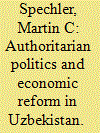

|
|
|
|
|
| Publication |
2007.
|
| Summary/Abstract |
All the ex-Soviet Central Asian states have super-presidential, authoritarian regimes with poor human rights records. Using the Universal Declaration of Human Rights, the article shows that Uzbekistan has sometimes improved, when the economy has been good, and has a mixed record on religious, labor, and language rights. All these states are sensitive to outside pressures if applied tactfully but try to maintain their independence from all outside powers
|
|
|
|
|
|
|
|
|
|
|
|
|
|
|
|
| 2 |
ID:
066335
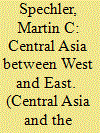

|
|
|
| 3 |
ID:
097145
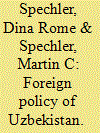

|
|
|
|
|
| Publication |
2010.
|
| Summary/Abstract |
Since 1991 the super-presidential regime of Islam Karimov in Uzbekistan has successfully defended the country's new independence and his authoritarian rule by cleverly enlisting the aid of outside powers such as Russia, China and the USA. With the means afforded by global export of its staple commodities, the regime has preserved stability by managing occasional conflicts with its neighbours, repressing dissenters when necessary, promulgating an ideology of multi-nationalism, and ample spending on health and educational services, as well as on government employees. The current economic crisis has meant the return of many Uzbeks from elsewhere in Asia, but the regime is trying to offset discontent with more spending.
|
|
|
|
|
|
|
|
|
|
|
|
|
|
|
|
| 4 |
ID:
101781
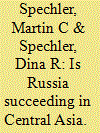

|
|
|
|
|
| Publication |
2010.
|
| Summary/Abstract |
On a number of recent occasions, the top Russian leadership has expressed its special interest in the affairs of former Soviet republics, including the assertion that Russia has a "privileged" relationship with these now independent states.1 Is this a claim of accomplished fact, of future intention, or perhaps an empty expression of nostalgia for lost status? As we see it, the record of Russian actions in the largest group of these states-the five of Central Asia-allows us to exclude the first and question whether the second is realizable. Russia must contend with the aspirations of those states themselves, as well as the determined interests of China and, to a lesser extent, the West.
|
|
|
|
|
|
|
|
|
|
|
|
|
|
|
|
| 5 |
ID:
083521
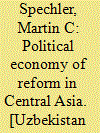

|
|
|
|
|
| Publication |
London, Routledge, 2008.
|
| Description |
viii. 172p.
|
| Standard Number |
978415775540
|
|
|
|
|
|
|
|
|
|
|
|
Copies: C:1/I:0,R:0,Q:0
Circulation
| Accession# | Call# | Current Location | Status | Policy | Location |
| 053940 | 338.9587/SPE 053940 | Main | On Shelf | General | |
|
|
|
|
| 6 |
ID:
091599
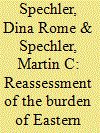

|
|
|
|
|
| Publication |
2009.
|
| Summary/Abstract |
A comprehensive accounting of the contributions and costs of East European satellite states to Soviet foreign and defence policy indicates that they were hardly ever a 'burden' to the USSR, even at their most costly in 1982, and therefore Gorbachev's decisions later in the decade to allow those regimes to distance themselves from Moscow must be interpreted as part of the Soviet leader's overall political strategy, not a result of material inability to maintain the status quo.
|
|
|
|
|
|
|
|
|
|
|
|
|
|
|
|
|
|
|
|
|